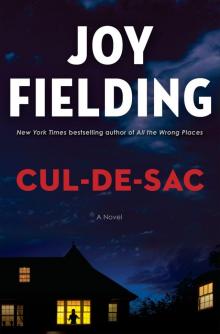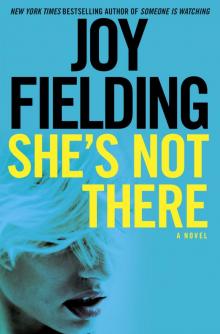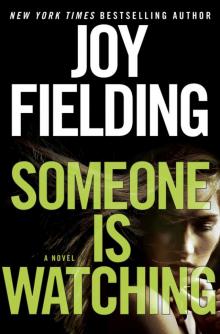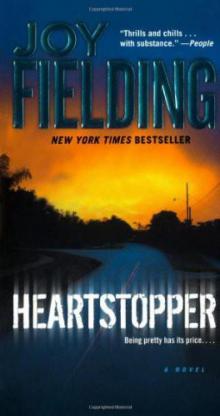- Home
- Joy Fielding
The First Time Page 3
The First Time Read online
Page 3
Me too, Mattie thought, leaning forward in her seat as the judge directed the prosecution to proceed. Time for me to make a decision and move on.
Light my fire. Light my fire. Light my fire.
One of the assistant state’s attorneys was instantly on his feet, doing up the button of his gray suit jacket, the way lawyers always did on TV, and walking toward the jury. He was a tall man, about forty, with a thin face and a long nose that hooked at its tip, rather like a candle dripping wax. There was a noticeable stir in the visitors’ block as everyone inched forward simultaneously, their silence heavy, like a dense fog, waiting for the lawyer’s voice to lead them toward the light. “Ladies and gentlemen of the jury,” the prosecutor began, making deliberate eye contact with each juror, then smiling. “Good morning.” The jury smiled back dutifully, one woman’s smile disappearing into an aborted yawn. “I want to thank you for your patience these last few weeks.” He paused briefly, swallowed, his large Adam’s apple bobbing into view above the pale blue collar of his shirt. “It’s my job to recount for you the simple facts of this case.”
Mattie coughed, a sudden, violent spasm that brought tears to her eyes.
“Are you sure you’re all right?” the blonde to her left asked, offering Mattie another tissue, while the blonde on Mattie’s right rolled her eyes in exasperation. It’s you, isn’t it? Mattie thought, wiping at her tears with the tissue. You’re the one sleeping with my husband.
“On the night of February twenty-fourth,” the prosecuting attorney continued, “Douglas Bryant returned home from an evening of drinking with his friends and was confronted by his mother, Constance Fisher. There was an argument, and Douglas Bryant stormed out of the house. He went back to the bar, had a few more drinks, then returned home at about two A.M., by which time his mother had gone to bed. He walked into the kitchen, took a long, sharp knife from one of the drawers, proceeded to his mother’s bedroom, and with deliberate calm plunged the knife into his mother’s stomach. One can only imagine the horror that Constance Fisher felt at realizing what was happening to her, and she made a valiant effort to ward off her son’s repeated blows. In all, Douglas Bryant stabbed his mother a total of fourteen times. One thrust punctured a lung, another went straight for her heart. As if this weren’t enough, Douglas Bryant then slashed his mother’s throat with such force he almost severed her head from her body. He then returned to the kitchen, where he used the knife to make himself a sandwich, took a shower, and went to bed. The next morning, he went to school and boasted of the killing to his fellow students, one of whom called the police.”
The assistant state’s attorney continued to go over the so-called simple facts of the case, reminding the jury of the witnesses who’d confirmed that Constance Fisher was afraid of her son, that the murder weapon was covered with Douglas Bryant’s fingerprints, that his clothing was covered with his mother’s blood, simple fact after simple fact, each item damning enough in itself, devastating when added together. What could Jake Hart possibly say that would mitigate the horror of what Mattie had just heard?
“It sounds pretty clear-cut,” she heard Jake agree, as if he were privy to her thoughts, as if he were speaking directly to her. Her eyes shot toward her husband as Jake rose to his feet, the jacket of his conservative blue suit already buttoned. She was gratified to note that he’d taken her advice and selected a white shirt instead of a blue one, although the deep burgundy tie he was wearing was unfamiliar to her. He smiled, a little Elvislike curling of his upper lip, and began addressing the jury in the soft, conversational, even intimate fashion that was his trademark. He makes you feel as if you’re the only person in the room, Mattie marveled, watching as each member of the jury unknowingly succumbed to his spell, leaning forward, giving him their undivided attention. The women to either side of Mattie fidgeted expectantly in their seats, their shapely rear ends nervously polishing the hard wooden bench beneath them.
Did he have to be so damned attractive? Mattie wondered, knowing Jake had always considered his looks as much a curse as a blessing, how hard he’d worked to play down his naturally handsome features in the fourteen years he’d been practicing law, the last eight with Richardson, Buckley and Lang. Jake knew that many of his colleagues groused that it had all come too easily for him: the good looks, the high marks, the instinct that told him which cases to take on and which to reject. But Mattie knew that Jake worked as hard as anyone at the firm, possibly harder, arriving at the office before eight each morning and rarely leaving before eight at night. Assuming he was actually in his office and not in a room at the Ritz-Carlton, Mattie thought, wincing as if she’d been struck.
“The way Mr. Doren presents it, everything in this case is either black or white,” Jake said, rubbing the side of his aquiline nose. “Constance Fisher was a dedicated mother and loyal friend, loved by all who knew her. Her son was a hothead who was failing at school and going out drinking every night. She was a saint; he was a holy terror. She lived in mortal fear; he was her mortal enemy. She dreamed of a better life for her son; he was every mother’s worst nightmare.” Jake paused and looked toward his client, who shifted uncomfortably in his seat. “It certainly sounds simple enough,” Jake continued, eyes returning to the jury, effortlessly catching them in his invisible net. “Except that things are rarely as simple as they sound. And we all know that.” Several of the jurors smiled their agreement. “Just as we know that when we mix black and white together, we get gray. And different shades of gray at that.”
Mattie watched her husband turn his back on the jury and walk over to where his client sat, confident that the eyes of each juror were on him. She watched him reach out and touch his client’s shoulder. “So, let’s take a few minutes and examine the varying shades of gray. Can we do that?” he asked, turning back to the jury, as if asking their permission. Mattie noticed one of the women jurors actually nodding her head in reply. “Firstly, let’s take a closer look at Constance Fisher, dedicated mother and loyal friend. Well, I don’t believe in blaming the victim,” Jake Hart said, and Mattie chuckled, knowing he was about to do just that. “I think that Constance Fisher was a dedicated mother and loyal friend.”
But? Mattie waited.
“But I also know she was a frustrated and bitter woman who verbally abused her son almost every day of his life, and often resorted to physical violence as well.” Jake paused, let the weight of his words sink in. “Now, I’m not trying to tell you that Douglas Bryant was an easy kid to mother. He wasn’t. He was many of the things that the prosecution claims, and those of us who have children,” he said, subtly aligning himself with the jurors, “understand just how frustrated his mother must have been, trying to deal with this kid who wouldn’t listen, who blamed her for his father walking out when he was a small boy, who was instrumental in the failure of her second marriage to Gene Fisher, who refused to show her the love and respect she felt she deserved. But stop for a minute,” Jake said, doing just that as the courtroom held its breath, waiting for him to continue.
How often had he rehearsed that moment? Mattie wondered, aware she was holding her breath, just like everyone else. How many seconds had he programmed that pause to last?
“Stop and consider the source of all that anger,” Jake continued after five full seconds had elapsed, instantly sucking his audience back in. “Little boys aren’t born bad. No little boy starts out hating his mother.”
Mattie brought her hand to her mouth. So this was why he’d taken this case, she realized. And why he would win.
It was personal.
A lawyer’s practice is almost always a reflection of his own personality, he’d once told her. By extension, did that make the courtroom the legal equivalent of the psychiatrist’s couch?
Mattie listened carefully as her husband recounted the horrors of the almost daily abuse Douglas Bryant had suffered at the hands of his mother—the washing his mouth out with soap when he was a child, the constant bad-mouthing, calling him stupid and worthl
ess, the frequent beatings that resulted in oft-documented bruises and occasional broken bones—which resulted in Douglas Bryant’s lashing out uncontrollably when he could no longer cope with the abuse, a textbook case of “child abuse syndrome,” Jake intoned solemnly, referring to the earlier testimony of several expert psychiatrists.
Was that what it was like for you? Mattie asked her husband silently, doubting she would ever receive a satisfactory answer. When they’d first started dating, Jake had made several veiled references to his troubled childhood, something Mattie related to instantly, being the survivor of a difficult childhood herself. But the more they’d dated, the less Jake confided, and whenever she pressed him for details, he’d clam right up, disappear into a funk for days at a time, until she learned not to ask any questions about his family. We have so much in common, she thought now, as she’d thought often during the many strained silences of their years together—the crazy mothers, the absent fathers, the lack of any real familial warmth.
Instead of siblings, Mattie had shared her childhood with her mother’s many dogs, never less than six, sometimes as many as eleven, all doted upon and adored, so much easier to love than a troublesome child who looked just like the father who’d abandoned them. And while Jake hadn’t been an only child—he’d had an older brother who died in a boating accident, and a younger brother who had disappeared into a drug-filled haze several years before she came along—Mattie knew her husband’s adolescence had been as lonely and pain-filled as her own.
No—worse. Much worse.
Why wouldn’t you ever talk to me about it? she wondered now, inadvertently raising her hand as if wanting to ask the question out loud. The motion caught her husband’s eye, distracting him from his summation. Maybe I could have helped you, she offered silently, their eyes locking across the room. His handsome face registered surprise, confusion, anger, and fear, all in less than a fraction of a second, all invisible to everyone but her. I know you so well, she thought, feeling a strange tickle at the back of her throat. And yet, I don’t know you at all.
Certainly you don’t know me.
And then suddenly the tickle at the back of her throat exploded, and she was laughing out loud, laughing so loud that everyone was turning around to look at her, laughing so uncontrollably that the judge was banging with her gavel, just like they do on TV, Mattie thought, laughing louder still, watching a uniformed officer approach. She caught the look of abject horror on her husband’s face as she jumped to her feet and propelled herself out of the row, trailing her coat along the floor after her. Reaching the large marble-framed wooden door at the back of the courtroom, Mattie turned back, her eyes briefly connecting with the horrified eyes of the woman with curly red hair from the row in front of hers. I always wanted curls like that, Mattie found herself thinking as the officer quickly ushered her out the door. If he said anything to her, she couldn’t hear it over her laughter, which continued unabated down seven flights of stairs and across the main lobby, down the outside steps, and onto the street.
THREE
Order. Order in the court.”
The judge was banging on her desk with her gavel, bouncing up and down in her high-backed leather chair, while the gallery before her buzzed nervously, like bees whose hive has been unexpectedly disturbed. Some of the spectators were whispering behind closed palms, others laughing openly. Several members of the jury talked animatedly among themselves. “What on earth …?” “What do you suppose …?” “What was that all about?”
Jake Hart stood in the center of the old courtroom, with its high ceiling, large side windows, and dark paneling, halfway between his client and the jury, too stunned to move, his shock rooting him firmly to the worn brown carpet beneath his black shoes, his fury spinning an invisible, protective cocoon around him, the noise and confusion of the courtroom swooping, like newly wakened bats, around his head. He felt like a grenade whose string had been pulled. If he took one step, if he so much as breathed, he would explode. It was important that he stay very still. He had to refocus, regroup, reclaim lost ground.
What the hell had happened?
It had been going so well, everything proceeding exactly according to plan. He’d worked for weeks on his summation—not only on the words he spoke, but on the way in which he spoke them, his inflection, the stress he placed on certain syllables, favoring this one over that, the pacing of his sentences, when to pause, when to continue. He’d memorized the words, perfected the cadence. It was going to be the speech of his life, the closing argument that would pull everything together, cap the highest-profile case of his career, a case the firm’s senior partners had expressed serious reservations about his taking on, a case they’d argued was hopeless, that didn’t stand the proverbial snowball’s chance in hell. It was also the case that would almost certainly guarantee him a partnership should he win it, propel him to the top of his profession at the ripe old age of thirty-eight.
And he’d done it. All his hard work had paid off. He’d had the jury in the palm of his hand, hanging on his every phrase. Child abuse syndrome—what the hell was that before he’d raised it as a defense? “The parallels with wife abuse syndrome are unmistakable and undeniable,” he’d been about to continue. “Indeed, the abused child is more vulnerable than the abused wife because the child has even less control over the situation, even less ability to choose his environment, to pack up his bags and get the hell out.” The words had been at the tip of his tongue; he’d taken a breath, was preparing to release them, when someone had landed a sucker punch to his solar plexus and knocked the wind right out of him.
What had happened?
He’d seen something out of the corner of his eye, some vague movement, as if someone were trying to get his attention, and he’d looked over, and there she was, Mattie, his wife, whom he’d specifically asked not to come to court this morning, there she was, and she was laughing, and not just some silly little giggle but this hideous, full-throated guffaw, laughing at something, he didn’t know what, perhaps laughing at what he was saying, at the audacity of his argument, maybe just laughing her contempt, at the proceedings, at the process, at him, and then Judge Berg was banging her gavel and calling for order, and Mattie was clumsily tripping over the laps of the people beside her, dragging her coat along the floor after her as she was escorted from the room, all the while surrounded by this hysterical, insane cackle he could still hear popping in his ears, like wires that are short-circuiting.
Five more minutes. That was all the time he’d needed. Another five minutes and he would have been finished with his closing argument. It would have been time for the prosecution’s rebuttal. Then Mattie could have pulled any stunt her little heart desired. She could have jumped up and down like some deranged jack-in-the-box, taken off all her clothes, if she wanted to, and laughed her fool head off.
What was the matter with her?
Maybe she wasn’t feeling well, Jake thought, struggling to be charitable. She’d slept in this morning, which was unusual in itself, and then that strange phone call to his office, that little-girl voice on the telephone, raw with vulnerability, suggesting she might come to court. There was nothing vulnerable about the Mattie Hart Jake knew. She was as strong and as forceful as a gale wind. And as potentially destructive. Had she deliberately set out to sabotage him? Was that her motive for showing up in court this morning after he’d specifically asked her not to?
“This court will come to order,” Jake heard the judge proclaim loudly, although no order came.
“What’s happening?” the defendant asked, his eyes those of a trapped and frightened child.
I know those eyes, Jake thought, his own childhood reflected back at him. I know that fear.
He pushed the unwanted memory aside, tried to do the same with his wife. But Mattie stood before him like a slender block of stone, delicate to look at but stunningly difficult to dislodge. As she’d always been, from the moment they’d first met.
God, not that crap agai
n, Jake thought, forcing one foot in front of the other, breaking free of his protective cocoon, now more like a coffin, to take his seat beside his client. He lifted the boy’s ice-cold hands inside his own.
“Your hands are so cold,” Douglas Bryant said.
“Sorry.” Jake almost laughed, except that there had been enough laughter in the court for one morning.
“We’ll take a half-hour recess,” the judge instructed, as all around Jake, the courtroom began emptying out, the people pulled as if by magnets toward the various exits. Jake felt Douglas Bryant’s hands slip through his fingers as he was led away. He watched the jury file out. What can I do to win you back? Jake wondered. What can I say that will obliterate the outrage my wife has perpetrated on this courtroom?
Did anyone realize she was his wife?
“Jake—”
The voice was familiar, soft, achingly feminine. He looked up. Oh God, he thought, feeling suddenly sick to his stomach. Why did she have to be here?
“Are you all right?”
He nodded, said nothing.
Shannon Graham reached out as if to touch him, stopped mere inches from his shoulder, her hand fluttering aimlessly in the air. “Is there anything I can do?” she asked.

 The Stranger Next Door
The Stranger Next Door Cul-de-sac
Cul-de-sac The Final Act
The Final Act When I Looked Away
When I Looked Away She's Not There
She's Not There All the Wrong Places
All the Wrong Places Now You See Her
Now You See Her Don't Cry Now
Don't Cry Now Good Intentions
Good Intentions Still Life
Still Life Lost
Lost The First Time
The First Time Whispers and Lies
Whispers and Lies The Other Woman
The Other Woman Charley's Web
Charley's Web Mad River Road
Mad River Road Puppet
Puppet Life Penalty
Life Penalty The Wild Zone
The Wild Zone Home Invasion
Home Invasion Someone Is Watching
Someone Is Watching Heartstopper
Heartstopper See Jane Run
See Jane Run The Bad Daughter
The Bad Daughter Shadow Creek
Shadow Creek Missing Pieces
Missing Pieces Kiss Mommy Goodbye
Kiss Mommy Goodbye Grand Avenue
Grand Avenue